

3 Steps to Healing Trauma that Everyone Should Know. Most people have had a traumatic experience of some kind.
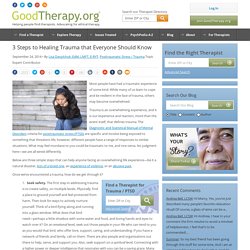
While many of us learn to cope and be resilient in the face of trauma, others may become overwhelmed. Trauma is an overwhelming experience, and it is our experience and reaction, more than the event itself, that defines trauma. The Diagnostic and Statistical Manual of Mental Disorders criteria for posttraumatic stress (PTSD) are specific and involve being exposed to something that threatens life; however, different people have a range of responses to similar situations. What may feel mundane to you could be traumatic to me, and vice versa. No judgment here—we are all wired differently. Below are three simple steps that can help anyone facing an overwhelming life experience—be it a natural disaster, loss of a loved one, an experience of violence, or an abusive past.
Once we’ve encountered a trauma, how do we get through it? Seek safety. Disclaimer: It is never this neat. . © Copyright 2014 GoodTherapy.org. Letting the Chips Fall: Control and Letting Go with Your Children. When I was a kid, one of my favorite game shows was The Price is Right.

I liked the game “Plinko”—where contestants earned “plinko chips” by accurately estimating prices of household goods (prominently displayed for the camera and, of course, flanked by beautiful, overly smiling models). At the cue of host Bob Barker, and with chips in hand, contestants climbed the steps leading up behind the “Plinko” wall so that they could release them one at a time, pinball style, down the wall and toward their dreams of “Showcase Showdown” success. Chips bounced about off of pegs placed tightly across the wall, eventually landing in slots at the bottom that were assigned prize dollar amounts. Emotional Agility. Executive Summary Reprint: R1311L The prevailing wisdom says that negative thoughts and feelings have no place at the office.
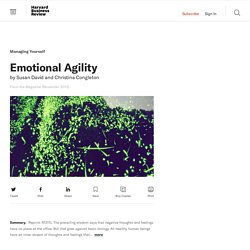
But that goes against basic biology. The Effects Of Negative Emotions On Our Health. Humans experience an array of emotions, anything from happiness, to sadness to extreme joy and depression.
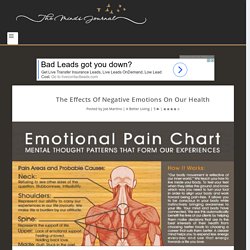
Each one of these emotions creates a different feeling within the body. After all, our body releases different chemicals when we experience various things that make us happy and each chemical works to create a different environment within the body. For example if your brain releases serotonin, dopamine or oxytocin, you will feel good and happy. Conversely, if your body releases cortisol while you are stressed, you will have an entirely different feeling associated more with the body kicking into survival mode. What about when we are thinking negative thoughts all the time? Positive vs. Is there duality in our world? What anxious and angry kids need to know about their brain. How the Brain Feels the Hurt of Heartbreak. Examining the Neurobiological Overlap Between Social and Physical Pain.
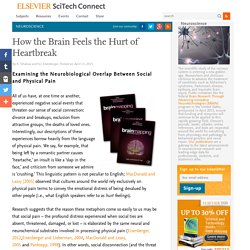
The Importance of Sadness. What if I told you that the way to change the world was not to be bold, resolute, brilliant, or even compassionate?
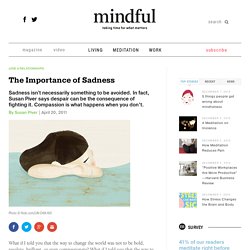
What if I told you that the way to change the world was to be sad? It sounds so improbable. When we think of those who have taught us the most about meaningful change, we think of people who are very, very brave, say, Martin Luther King, Mahatma Gandhi, the Dalai Lama. Unwavering. Deep. Trauma treatment - All In The Mind.
Lynne Malcolm: Welcome to All in the Mind on RN, Lynne Malcolm with you.
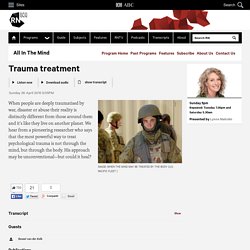
Today, healing trauma through the mind and the body. True Stories of Trauma and Madness—and Why Portrait Sitters Tend to Face Left [Excerpt] Excerpted from The Tale of the Dueling Neurosurgeons: The History of the Human Brain as Revealed by True Stories of Trauma, Madness and Recovery, by Sam Kean.
![True Stories of Trauma and Madness—and Why Portrait Sitters Tend to Face Left [Excerpt]](http://cdn.pearltrees.com/s/pic/th/portrait-scientific-american-92902099)
Copyright © 2014 by Sam Kean. Eve Ensler on How Trauma Makes Us Leave Our Bodies and Disconnect from Ourselves. By Maria Popova.
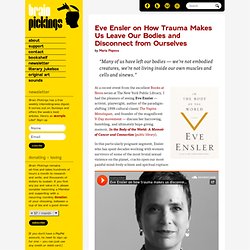
9 Nervy Facts About the Vagus Nerve. MRI scans reveal what almost dying in a plane crash does to your brain. A group of passengers who were convinced they were going to die when their plane lost power over the Atlantic Ocean in 2001 have had their brains scanned while recalling the experience.

It sounds pretty brutal, but the results are providing important insight into how our brains process and store traumatic memories, and could help scientists to better understand post-traumatic stress disorder (PTSD). Anxiety: The Underlying Cause Everyone Should Know About. ~ Bella Dodds. Via Bella Doddson May 23, 2014 We all know gripping anxiety, worrisome emotions and inner panic are horrible feelings to manage on a daily basis, but what if anxiety is not a meaningless mistake? What if anxiety is a biological response to trapped and unresolved stress in our bodymind (mind, body and spirit)? If we only focus on the symptoms, we will be stuck trying to sedate and control our inner panic, but if we focus on the cause, we can address the heart of the matter.
People struggling with anxiety, burnout or adrenal fatigue who have had enough of coping with these exhausting symptoms can reflect on these powerful questions: This Is Your Body On Anxiety (Infographic) - mindbodygreen.com. What Anxiety Does to Your Brain and What You Can Do About It. 10 Fun Ways To Reduce Your Cortisol Levels. 10 images The body knows how to heal itself. As I describe in Mind Over Medicine: Scientific Proof That You Can Heal Yourself, our bodies are beautifully equipped with natural self-repair mechanisms that fight cancer, prevent infection, repair wounds, protect us from infectious agents and foreign bodies, and even affect how our genes express themselves!
But here’s what most people don’t know. These natural self-repair mechanisms get deactivated when your body is full of stress hormones like cortisol and epinephrine. The good news is that it’s easy to shift the body from the stress response to the relaxation response, and when this happens, your cortisol levels drop and your body’s self-repair mechanisms get back to work healing you. Photo Credit: Shutterstock.com. How We Grieve: Meghan O’Rourke on the Messiness of Mourning and Learning to Live with Loss.
By Maria Popova. How the Brain Feels the Hurt of Heartbreak. Jesse Bering on the Neurochemistry and Adaptive Value of Heartbreak. By Maria Popova The science of why it’s possible to actually die of a broken heart. What Happens to Your Body During a Breakup? Scientists Are Beginning to Figure Out Why Conservatives Are…Conservative. Scientists are using eye-tracking devices to detect automatic response differences between liberals and conservatives.University of Nebraska-Lincoln You could be forgiven for not having browsed yet through the latest issue of the journal Behavioral and Brain Sciences.
If you care about politics, though, you'll find a punchline therein that is pretty extraordinary. Click here to read more from Mooney on the science of why people don't believe in science. Behavioral and Brain Sciences employs a rather unique practice called "Open Peer Commentary": An article of major significance is published, a large number of fellow scholars comment on it, and then the original author responds to all of them.
The approach has many virtues, one of which being that it lets you see where a community of scholars and thinkers stand with respect to a controversial or provocative scientific idea. That's a big deal. The Neuroscience of Calming a Baby. Log In.